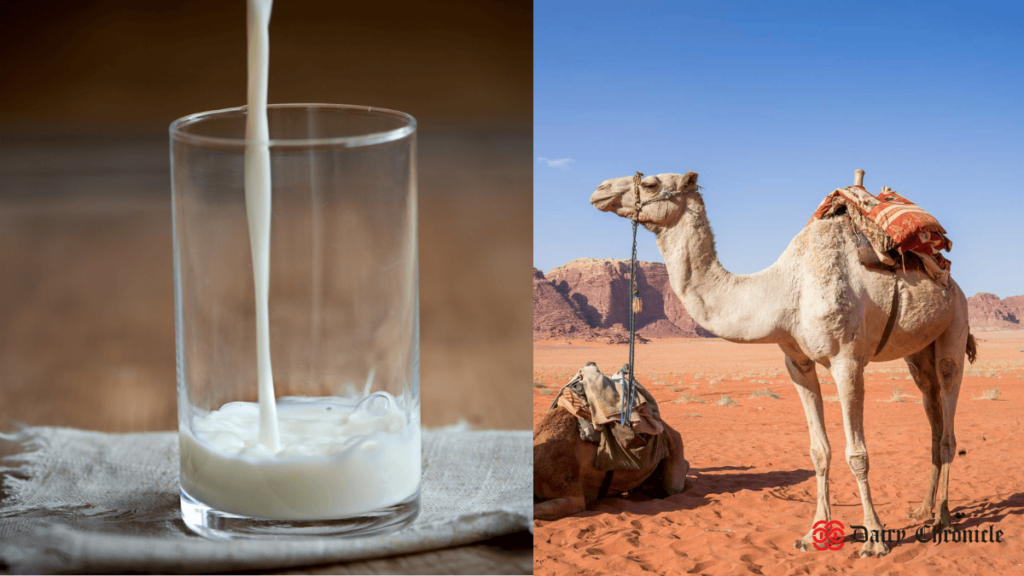Camel milk is a nutritious alternative to cow’s milk, offering unique proteins, low lactose content, and potential benefits for diabetes, digestion, and immune health.
As health consciousness continues to rise, many are exploring alternative sources of nutrition that offer unique benefits. Camel milk, once a staple in certain communities, is now gaining popularity worldwide. Its rich nutritional profile has led some to compare it to mother’s milk, though it’s essential to separate fact from myth. In this article, we delve into the nutritional value of camel milk, its benefits, and the recommended daily intake.
Nutritional Value of Camel Milk
Camel milk is often touted as a superior alternative to cow’s milk, particularly for its protein content. However, claims that camel milk contains four times more protein than cow’s milk are not entirely accurate. According to Dr. R. K. Vamal, Director of the National Camel Research Center, camel milk contains approximately 2.9–3.5% protein, similar to cow’s milk, which has about 3.2–3.5% protein. Despite the comparable protein levels, camel milk stands out due to its unique protein composition and other nutrients.
Camel milk is also rich in calcium, vitamin C, and iron. These nutrients are crucial for bone health, boosting the immune system, and maintaining overall health. The milk’s low lactose content makes it an excellent choice for those with lactose intolerance. Additionally, camel milk contains higher levels of unsaturated fatty acids and certain bioactive compounds, which have been associated with anti-inflammatory and antioxidant properties.
Unique Compounds in Camel Milk
Camel milk contains unique proteins, such as lactoferrin and immunoglobulins, that contribute to its health benefits. Lactoferrin, for instance, has antimicrobial properties and helps in iron absorption, while immunoglobulins play a crucial role in immune system support. These compounds are not as prevalent in cow’s milk, giving camel milk an edge in specific health benefits.
Furthermore, camel milk contains insulin-like proteins, which may help lower blood sugar levels. This makes it particularly beneficial for people with diabetes, as it can complement traditional diabetes management strategies.
Recommended Consumption
Health experts suggest consuming camel milk in moderation. A daily intake of 200-250 ml is sufficient to meet your body’s nutritional needs. This quantity allows you to benefit from the milk’s nutrients without overconsumption.
It’s important to note that while camel milk offers many benefits, it should be integrated into a balanced diet rather than consumed as the sole source of nutrition. Its unique properties make it a valuable addition, but like any food, moderation is key.
Health Benefits of Camel Milk
- Rich in Nutrition: Camel milk is packed with proteins, calcium, vitamin C, and iron, making it a powerhouse of nutrition. These nutrients contribute to various bodily functions, including bone strength, immune support, and overall health maintenance.
- Strengthens the Immune System: The unique proteins and nutrients in camel milk help fortify the immune system, protecting the body against illnesses. Its high levels of antioxidants also aid in reducing oxidative stress, which is linked to chronic diseases.
- Good for Digestion: Camel milk has a lower lactose content than cow’s milk, making it easier to digest. It’s particularly beneficial for people with lactose intolerance, offering them a nutritious alternative to traditional dairy. Additionally, camel milk contains probiotics, which support a healthy gut microbiome and improve digestive health.
- Beneficial for Diabetics: Some studies have shown that camel milk may help manage type 1 and type 2 diabetes. Its ability to regulate blood sugar levels makes it a valuable addition to a diabetic-friendly diet. The insulin-like proteins in camel milk mimic insulin’s effects, which may reduce the need for external insulin therapy in some cases.
- Anti-inflammatory and Antioxidant Properties: Camel milk contains bioactive compounds that exhibit anti-inflammatory and antioxidant properties. These properties can help reduce the risk of chronic diseases such as heart disease and cancer, making camel milk a potentially protective dietary choice.
- Supports Autism Therapy: Emerging research suggests that camel milk may benefit children with autism spectrum disorders. Some studies indicate that the unique composition of camel milk might help improve behavioral symptoms and cognitive function in autistic children. However, more research is needed to confirm these findings.
Potential Challenges and Considerations
While camel milk offers numerous health benefits, there are some challenges and considerations to keep in mind:
- Cost and Availability: Camel milk is often more expensive and less widely available than cow’s milk. This can make it challenging for some individuals to incorporate it into their regular diet.
- Taste and Adaptation: The taste of camel milk is distinct and may take some getting used to, especially for those accustomed to cow’s milk. It is slightly saltier and has a different texture, which might not appeal to everyone.
- Regulatory and Quality Concerns: Depending on the region, camel milk may not be as strictly regulated as cow’s milk. Ensuring that you purchase from reputable sources that adhere to quality standards is essential to avoid potential health risks.
Camel milk is a remarkable alternative to traditional dairy, offering a host of health benefits. While it may not contain four times the protein of cow’s milk, its unique nutritional profile, immune-boosting properties, and suitability for lactose-intolerant individuals make it a valuable addition to your diet. Whether you’re looking to strengthen your immune system, improve digestion, manage diabetes, or explore natural therapies for chronic conditions, camel milk could be the nutritional boost you need. However, it’s essential to approach its consumption with an understanding of its challenges and integrate it thoughtfully into a balanced diet.



